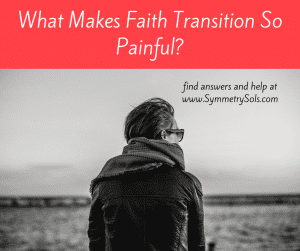I’m currently going through a faith crisis. I am so scared to talk to anyone about my doubts or thoughts. I feel really alone and I don’t want to mess up my relationships with those I love most. Why is this so hard?
Today’s guest post is written by Lisa Butterworth. Opinions shared on guest posts may not completely reflect the positions of the blog’s author.
Lisa Butterworth, LPC, NCC has a masters degree in Clinical Mental Health Counseling from Idaho State University, primarily working with issues of relational health, faith transitions and journeys, women’s issues and sexuality. She is the founder of the popular Feminist Mormon Housewives website and support group and is a provider for Symmetry Solutions.
Ask yourself this hypothetical question: If you had to choose between being rejected by everyone you love… or losing a limb or one of your senses… which would you choose?
It is a horrible question and yet gets to the heart of the kinds of pain we fear most. Being unloved… being rejected… feeling unloveable even.
One reason why faith transitions are painful and terrifying is because they expose a deep fear that if we change… if our beliefs change… if our faith changes… if our values change… then maybe our family, our friends, our people will not love and accept us any more. And even deeper than that, maybe they will decide we are bad. Maybe they will see us as broken. Maybe they will judge us and come to believe that we do not deserve to be loved or belong. Maybe we will not be allowed to participate in the group in the same ways we used to be able to.
Even deeper… maybe sometimes, in dark moments, we judge ourselves. Maybe we start to worry that our doubts really do make us bad. Maybe in the doubt of deity we have the fear that an existing God does not love us enough to fix our faith, or fix our doubts. Or maybe we worry that we did not try hard enough and all this turmoil is our own fault because we somehow did not do the right things to not have this turmoil to begin with.

We might decide logically that this is not true. And yet the fear dwells there in our shadows and jumps up to hurt us when things are going badly. This fear can sometimes feel confirmed if we start to share our doubts with family and friends and in response they say judgmental, rejecting and/or hurtful things.
Another reason why faith transitions are painful is that *Certainty* and *Knowing the Truth* feel really good. Our brains are wired to give us pleasure when we figure things out. Little babies explore the world with rapt curiosity because every time they figure out how to shake the rattle or push a button to make a light come on, their brains release a little shot of pleasure hormone and it feels so great! Knowing the Truth becomes a life-long habit of mind. For many who grow up in religious environments it is tied to a belief in God and the correlated teachings. We are often taught from a young age that our Certainty is how we know God and how we earn our worthiness, and this knowing feels comforting.
The problem with Certainty is that while the pleasure, happiness and security it helps us feel is real, Certainty itself is quite fragile. There may have been a time when information that did not confirm our precious Certainty was easy to dismiss. Now something may have shifted to change that process. And while there is something possibly exciting and growth producing about allowing doubts and new ideas to inform us, they do not bring us the pleasure or the satisfying sense of having all the answers Certainty used to afford.
What things have made Faith Transition painful for you if this is something you have experienced?
Natasha Helfer Parker, LCMFT, CST can be reached at natashaparker.org and runs an online practice, Symmetry Solutions, which focuses on helping families and individuals with faith concerns, sexuality and mental health. She hosts the Mormon Mental Health and Mormon Sex Info Podcasts, writes a regular column for Sunstone Magazine, is the current president of the Mormon Mental Health Association and runs a sex education program, Sex Talk with Natasha. She has over 20 years of experience working with primarily an LDS/Mormon clientele.













